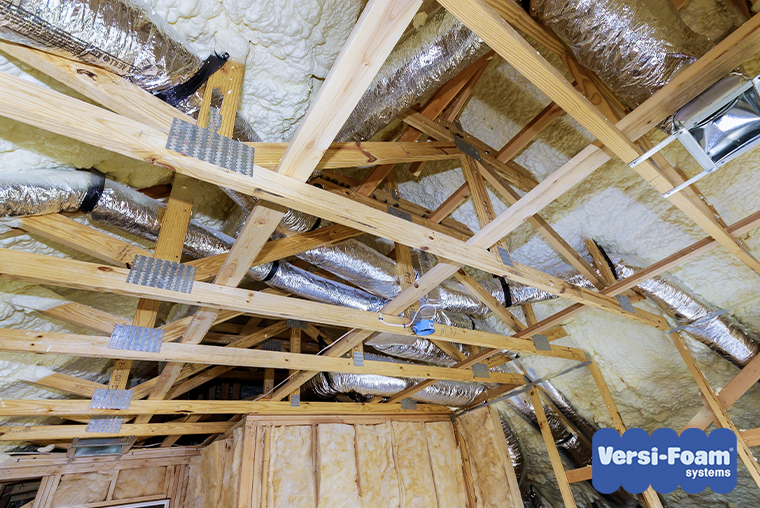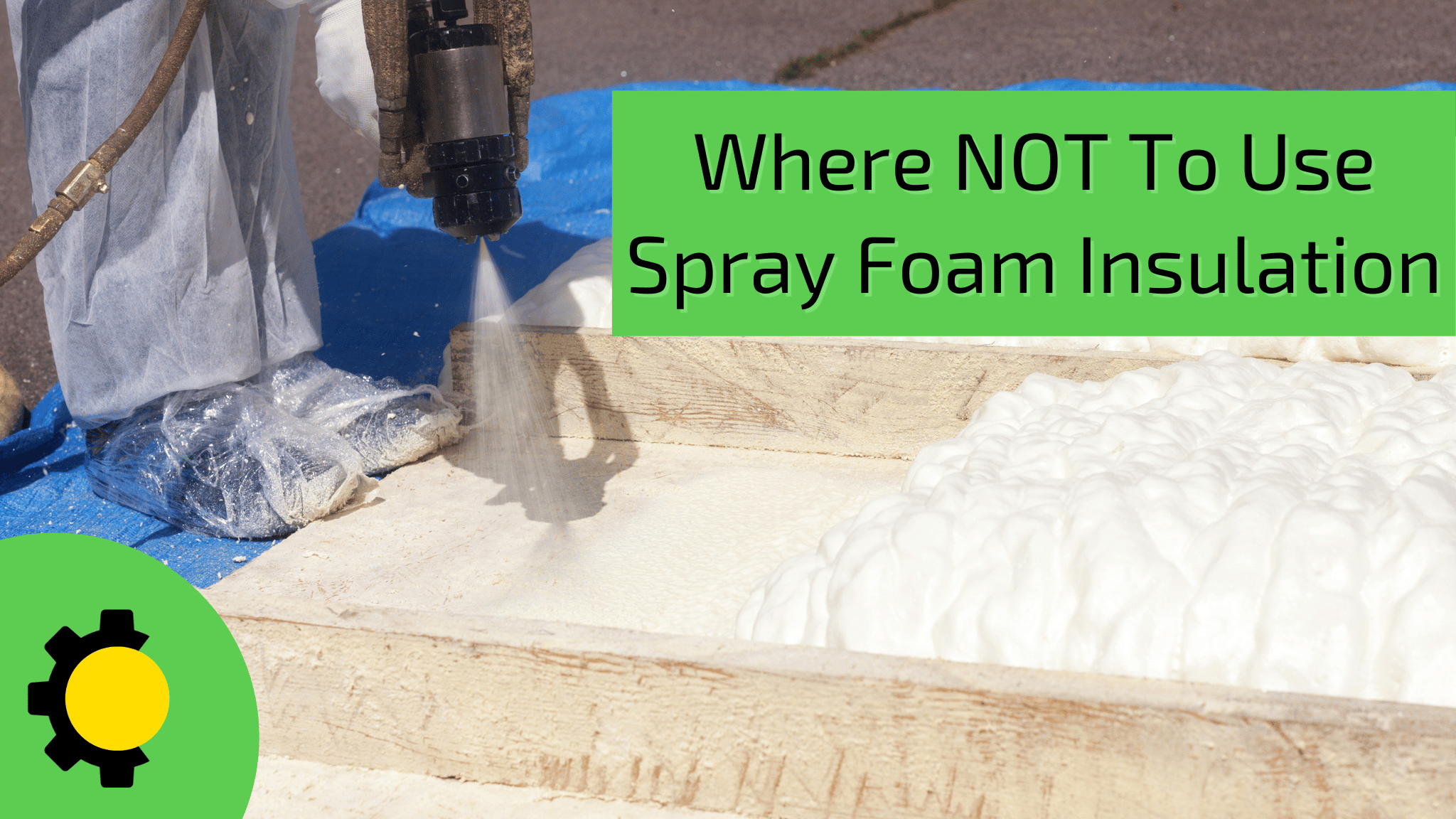The Ecological Impact of Spray Foam: Sustainability Factors To Consider
The Ecological Impact of Spray Foam: Sustainability Factors To Consider
Blog Article
Exactly How Spray Foam Can Improve Power Effectiveness in Any Kind Of Building
Spray foam insulation has arised as a pivotal solution for improving energy effectiveness across various building kinds. By producing an impermeable seal that minimizes air leak, it successfully manages interior climates while significantly lowering heating & cooling expenses. Its excellent R-value and moisture-resistant properties add to long-lasting power savings and boosted structure long life. As homeowner progressively seek lasting solutions, the implications of spray foam insulation expand past simple energy financial savings. The full extent of its benefits, nevertheless, warrants a more detailed evaluation of exactly how it can change power administration methods in both residential and industrial settings.
Comprehending Spray Foam Insulation
Spray foam insulation is increasingly recognized for its superior thermal efficiency and adaptability in numerous applications. Made up primarily of polyurethane, this insulation product is used as a liquid that increases upon get in touch with, filling up spaces and creating a seamless barrier. This one-of-a-kind residential or commercial property allows spray foam to adapt irregular surfaces, making it a perfect option for both commercial and residential structures.

Application of spray foam insulation is commonly performed by trained experts using customized devices, ensuring optimal efficiency and safety and security - Spray Foam. The healing process is fast, enabling quick installation and marginal disturbance. Because of this, spray foam insulation is progressively being employed in brand-new building and retrofitting jobs due to its capability to improve structural honesty while enhancing overall energy performance in structures
Benefits of Energy Efficiency
Power effectiveness plays a crucial function in reducing operational costs and minimizing ecological effect throughout different fields. By maximizing energy usage, house owners and businesses can achieve significant savings on utility costs, which directly enhances financial performance. Efficient energy consumption suggests much less reliance on nonrenewable fuel sources, thereby adding to a reduction in greenhouse gas exhausts and promoting an extra lasting atmosphere.
Moreover, energy-efficient buildings typically experience raised residential or commercial property values. As energy expenses climb and sustainability ends up being a priority for customers, buildings with enhanced power efficiency features are much more appealing on the market. This fad urges financial investment in energy-saving technologies, which can further drive technology and economic development.
In enhancement to economic and environmental advantages, energy performance can also improve the total convenience and health and wellness of interior rooms. Appropriate insulation and effective home heating and air conditioning systems assist maintain regular temperatures, lowering drafts and humidity degrees, which subsequently can cause better indoor air quality.
Inevitably, the benefits of power performance extend past immediate financial savings, promoting a durable economic situation, promoting environmental stewardship, and improving the high quality of life for owners in any type of structure.
Exactly How Spray Foam Works
Typically applied as a liquid, spray foam expands rapidly upon contact with surfaces, creating a solid obstacle that effectively seals gaps and fractures. This special home is because of its chemical structure, mainly consisting of polyols and isocyanates, which react when mixed to produce a foam that fills voids and adheres to numerous materials, consisting of metal, concrete, and timber.
When applied, the foam expands to several times its initial volume, making certain a limited seal that prevents air leak. This procedure substantially lowers thermal connecting, which occurs when warm transfers with products, leading to energy loss. The foam's high R-value, an action of thermal resistance, adds to enhanced insulation by reducing warmth transfer in between the inside and outside environments.
Furthermore, spray foam is immune to moisture and parasites, further improving its effectiveness in preserving energy performance. Its application can be customized to various areas, consisting of attic rooms, walls, and crawl areas, maximizing insulation across a building. Spray Foam. In general, the innovative design and application technique of spray foam make it an effective solution for enhancing power performance in any framework, leading to minimized power costs and a more sustainable built setting

Applications in Various Structures
Many applications of spray foam insulation can be discovered across various building kinds, improving energy performance and convenience. In property homes, spray foam is frequently made use of in attics and walls to create a seamless barrier versus air leakages, significantly minimizing heating and cooling down demands. This application is specifically valuable in older homes, where standard insulation may be insufficient.
In commercial structures, spray foam insulation is applied to roof systems and outside walls, which assists to improve thermal performance and safeguard versus moisture intrusion. Its light-weight nature makes it a perfect selection for retrofitting existing frameworks without adding substantial weight. In addition, spray foam can be used in commercial settings to shield pipes and tank, preserving temperature control for sensitive products.
Institutional structures, such as institutions and hospitals, advantage from spray foam insulation by guaranteeing a constant interior climate that supports resident convenience and health. The adaptability of spray foam enables it to adjust to numerous structure sizes and shapes, making it more information a favored option for architects and home builders seeking efficient insulation solutions. Overall, spray foam insulation functions as a critical part in accomplishing energy-efficient buildings across internet all fields.
Long-Term Price Savings
Spray foam insulation supplies significant long-lasting cost savings for structure owners and residents by lowering power intake and lowering utility costs. By supplying a superior air seal, spray foam lessens the infiltration of outside air, thereby enhancing the thermal performance of a building. This causes much more effective heating and cooling down procedures, which can lead to significant reductions in energy costs with time.
In addition to prompt financial savings on energy expenses, the resilience and durability of spray foam insulation add to its monetary advantages. Unlike standard insulation materials, which might sag, settle, or degrade, spray foam maintains its effectiveness for years, minimizing the demand for constant replacements or repair work. This durability equates to reduce maintenance expenses and less disturbance for residents.
Moreover, structures equipped with spray foam insulation often appreciate a rise in residential or commercial property worth, making them much more enticing to prospective purchasers or lessees. As power efficiency ends up being increasingly prioritized, residential properties with reliable insulation solutions stick out out there. Ultimately, the assimilation of spray foam insulation not only boosts comfort however also represents a calculated financial investment that produces considerable financial advantages over the long term.
Final Thought
Finally, spray foam insulation serves as a crucial part in improving energy performance throughout diverse structure kinds. Its capability to develop a smooth barrier against air leakage, integrated with moisture-resistant residential properties and high r-values, significantly decreases energy consumption and associated costs. The application of spray foam not just adds to consistent interior temperature levels but also enhances home worth, underscoring its role as like this a prudent investment for both commercial and domestic residential properties.
Spray foam insulation has arised as a crucial option for improving energy efficiency throughout various structure types. Spray Foam. As a result, spray foam insulation is increasingly being employed in new building and retrofitting tasks due to its capability to boost architectural honesty while improving general power efficiency in buildings
Overall, the innovative style and application approach of spray foam make it an efficient service for boosting energy effectiveness in any kind of framework, leading to reduced power costs and a much more sustainable constructed environment.
Various applications of spray foam insulation can be discovered throughout various structure types, boosting energy effectiveness and comfort.In conclusion, spray foam insulation offers as an important part in boosting energy efficiency across diverse building kinds.
Report this page